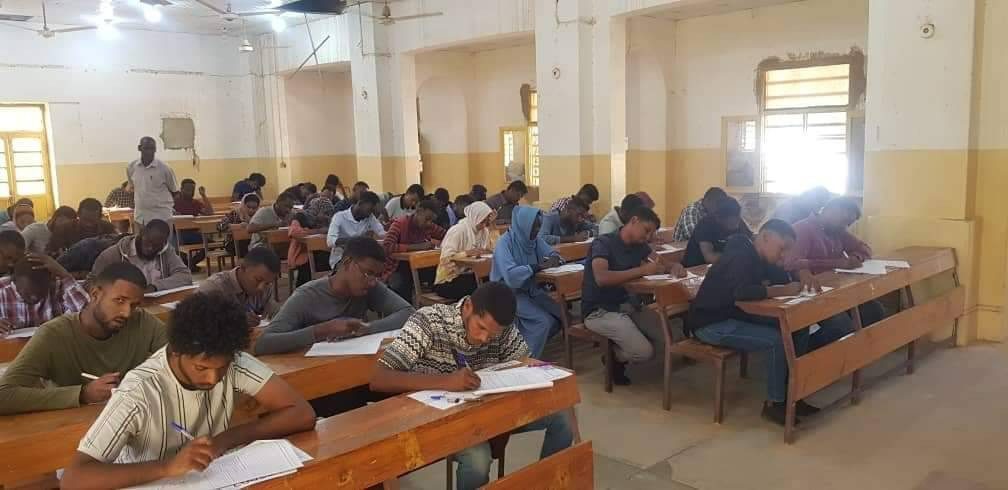A journalist & academic with a Ph.D. in applied linguistics. He works in various fields; teaching, translation, editing, writing for digital newspapers, and human rights defense.
The destroyed Ministry of Higher Education
A few days to come, the ongoing conflict in Sudan between the Sudan Army Force (SAF) and the paramilitary Rapid Support Forces (RSF) has persisted for the duration of an entire academic year. The education system has been completely disrupted throughout the country ever since the outbreak of war on April 15th this year. According to UNICEF, a staggering 19 million children are deprived of primary and secondary education since the war erupted, and this situation extends to higher education students as well.
Certain educational institutions are set ablaze, others are looted, some are bombed, and a few of their structures are repurposed as shelters for the displaced.
Despite the challenging circumstances, university administrations persevere and implement commendable measures to ensure the continuous provision of education and salvage the academic year through direct teaching or the establishment of online teaching platforms, exam centers both within and outside Sudan.
Mohamed Ali, an academic who currently lives in Khartoum said “I was so saddened to see the headquarters of ministry of Higher Education and Scientific Research on fire as the result of a deliberate attack. The university campuses in Khartoum become the battlegrounds for the conflicting factions, resulting in the complete destruction of numerous classrooms, administrative offices, and laboratories.”
The repercussions of war have left a mark on every educational institution the universities in Khartoum and Darfur have experienced significant damage and devastation. Khartoum, being the capital, is home to a total of nine government universities, five private universities, and nearly twenty university colleges. The estimated number of students enrolled in universities in Khartoum is approximately 400,000.
Professor Al-Nour Khair lamented “it is heartbreaking and terrible seeing the burning, looting, and destruction in the universities of Zalingei, El-Geniena and Nyala. The situation is no different in the universities of the three cities of Kordofan state, which they were also affected by the bad security conditions in these cities.”

The hopes and challenges of professors
Several universities, including Shendi University, Dongola University, Red Sea University, and Damazin University, have started their educational activities. Conversely, universities in Khartoum State, which have been impacted by the war, have also initiated online teaching for their students and set up examination centers in Egypt and other centers in safer cities within Sudan. University of Khartoum is a living example of such move; however the challenges of online education hinder the educational process.
Nada Eljack, a professor who currently teaches her students online from exile, expressed her appreciation for the e-learning program implemented by universities to cater to the needs and future of the students. However, she highlighted a significant challenge faced by students residing in war-torn regions who lack access to the internet. Additionally, even students in relatively safe areas encounter difficulties due to limited internet connectivity and expensive subscription fees. The internet has never been very developed in Sudan unlike in numerous other countries.
Professors opine that electronic teaching serves as a viable alternative, particularly for universities situated in conflict-ridden areas. Furthermore Al-Nour Khair said “These efforts are commendable, however, they fall short of what is required. While they serve as a confirmation of presence and willingness to work, they do not suffice. Considering the large number of students, it becomes challenging to adequately address their academic standing in the universities of Khartoum State.”
Displaced families and individuals who sought shelter in university premises located in Gezira State, Sennar, Kassala, and Gedaref were compelled to vacate these premises to allow for the resumption of educational activities, leaving them without a place to stay.
University professors, alongside with civilians, have launched a call urging the conflicting parties to reach a consensus on a durable ceasefire that will pave the way for lasting peace which is the expected hope and if that hope is realized the question still remains: how will universities resume their educational process in light of the devastation that has befallen all infrastructures at the universities? Al-Nour Khair answered “I observed the devastation that the University of Juba endured prior to secession, when it was relocated to northern Sudan as a result of the war. I was one of the students who enrolled at the University of Juba in the early 1990s, and we pursued our studies for over four semesters in makeshift tents and equipped cabins. Despite the challenging circumstances, the educational journey progressed smoothly. While I am not bothered by the current state of the universities in terms of their physical structures and debris, I am deeply troubled by the prolonged duration of the war.” And he continued “From the heart of suffering comes challenge, from the midst of the rubble, universities rise so that nations can rise”.

